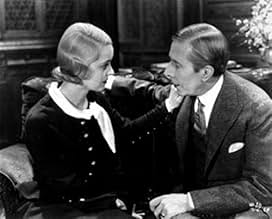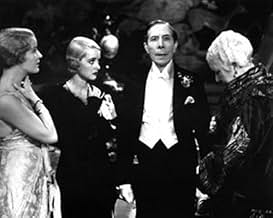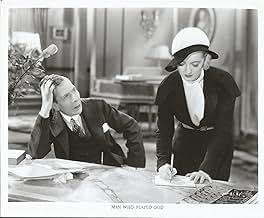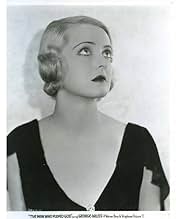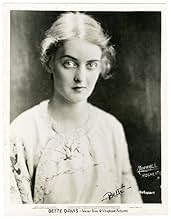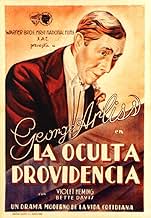IMDb RATING
6.8/10
1.4K
YOUR RATING
After losing his hearing, a musician uses lip-reading to help others.After losing his hearing, a musician uses lip-reading to help others.After losing his hearing, a musician uses lip-reading to help others.
- Awards
- 1 win total
George Arliss
- Montgomery Royle
- (as Mr. George Arliss)
André Luguet
- The King
- (as Andre Luguet)
Ivan F. Simpson
- Battle
- (as Ivan Simpson)
Charles E. Evans
- The Doctor
- (as Charles Evans)
Fred Howard
- Man
- (scenes deleted)
Symona Boniface
- Woman in Audience
- (uncredited)
Wade Boteler
- Detective
- (uncredited)
Elspeth Dudgeon
- Would-Be Ticket Buyer
- (uncredited)
Grace Durkin
- Kit - First Girl
- (uncredited)
Helena Phillips Evans
- Music Fan with Boy
- (uncredited)
Featured reviews
Although George Arliss made several of the roles he did on stage into films both sound and silent The Man Who Played God was not one of them. Another stage legend Otis Skinner originated that role on Broadway although Arliss filmed it twice both as a silent and with sound.
We can only speculate about what Skinner did with the part, but Arliss because we have him on film can truly be said to make the part his own. His is a style that many find old fashioned, but I find most compelling when he's performing.
The story is that of a famous concert pianist who was born into a wealthy family so he's never in danger of missing a meal. A bomb set off at a private performance has left him stone deaf and in a great deal of despair. But he learns the art of lip reading and from his Central Park penthouse with opera glasses in hand spies on a lot of ordinary people and becomes their anonymous benefactor.
Bette Davis made her Warner Brothers debut and the first of two films with George Arliss. Davis who was not exactly shy about criticizing her colleagues had nothing but praise for this man. She credited him with being the first to realize the potential she had as an actress. She plays a student of his who mistakes romantic love for an admiration as an artist she feels. She's not given much to work with in the role, but she does far more than could be expected.
Louise Closser Hale as Arliss's sister and Ivan Simpson as his butler who has a wonderful scene preventing Arliss from suicide also stand out. Look also for Ray Milland in a small part as another man on the verge of suicide.
The Man Who Played God is old fashioned in its presentation, but still holds up well after 80 years.
We can only speculate about what Skinner did with the part, but Arliss because we have him on film can truly be said to make the part his own. His is a style that many find old fashioned, but I find most compelling when he's performing.
The story is that of a famous concert pianist who was born into a wealthy family so he's never in danger of missing a meal. A bomb set off at a private performance has left him stone deaf and in a great deal of despair. But he learns the art of lip reading and from his Central Park penthouse with opera glasses in hand spies on a lot of ordinary people and becomes their anonymous benefactor.
Bette Davis made her Warner Brothers debut and the first of two films with George Arliss. Davis who was not exactly shy about criticizing her colleagues had nothing but praise for this man. She credited him with being the first to realize the potential she had as an actress. She plays a student of his who mistakes romantic love for an admiration as an artist she feels. She's not given much to work with in the role, but she does far more than could be expected.
Louise Closser Hale as Arliss's sister and Ivan Simpson as his butler who has a wonderful scene preventing Arliss from suicide also stand out. Look also for Ray Milland in a small part as another man on the verge of suicide.
The Man Who Played God is old fashioned in its presentation, but still holds up well after 80 years.
First and foremost, "The Man Who Played God" (1932) is not a Bette Davis vehicle. She was still a few years away from receiving top billing and graduating into 'A' pictures. However, the mere fact that she's in this overlooked and forgotten film will only push it into wider circulation and rapidly increase its number of viewers. So much has already been said about her, there's very little one can add to further compliment her. Personally, I think she gave some of her best performances in these early 1930s B programmers for Warner Bros. Sure, the material wasn't nearly as good, which only made her performances stand out all the more. But Bette Davis has little to do with what stands out about this movie.
After losing his hearing, a well-loved and respected piano player (George Arliss) becomes a recluse. He rejects most of his old friends and companions, and is cruel to the few he does see. He learns to read lips, but grows more and more depressed at the same time. And finally when he has hit rock bottom, he finds a purpose in his life,... philanthropy. Putting aside his own problems and selfishness, his salvation comes from helping others. This is a theme that would recur over and over again to varying degrees in the Depression era 30s (especially in Frank Capra's movies).
The other thing of interest here is the act of voyeurism. Through the aid of binoculars, he's able to read lips, and essentially, spy on everyday New Yorker's. One can't help but wonder if this little movie may have had some influence or have been the basis for the idea of Cornell Woolrich's short story "It Had to Be Murder", which would be eventually adapted into Alfred Hitchcock's "Rear Window" (1954).
This movie, is, by no means a masterpiece, but its still an important one. With so many interesting ideas going on here, its well worth the watch.
After losing his hearing, a well-loved and respected piano player (George Arliss) becomes a recluse. He rejects most of his old friends and companions, and is cruel to the few he does see. He learns to read lips, but grows more and more depressed at the same time. And finally when he has hit rock bottom, he finds a purpose in his life,... philanthropy. Putting aside his own problems and selfishness, his salvation comes from helping others. This is a theme that would recur over and over again to varying degrees in the Depression era 30s (especially in Frank Capra's movies).
The other thing of interest here is the act of voyeurism. Through the aid of binoculars, he's able to read lips, and essentially, spy on everyday New Yorker's. One can't help but wonder if this little movie may have had some influence or have been the basis for the idea of Cornell Woolrich's short story "It Had to Be Murder", which would be eventually adapted into Alfred Hitchcock's "Rear Window" (1954).
This movie, is, by no means a masterpiece, but its still an important one. With so many interesting ideas going on here, its well worth the watch.
In "The Man Who Played God" the venerable George Arliss plays a famous and sweet-natured concert pianist who must cope with catastrophic hearing loss. There are two male-female romantic love subplots, but the story is essentially about philosophical and moral issues. The movie is best remembered not for Arliss, who was the main attraction, but for a supporting role beautifully played by the future screen queen Bette Davis, who for the most part is also very well photographed by James Van Trees, enhancing her unique presence. Amusingly, Mordaunt Hall of The New York Times in his review of the film faulted her for speaking "too rapidly for the microphone." But Arliss himself, as an artist suddenly forced to reconstruct his whole approach to life, is sympathetic and compelling despite the lipstick he habitually wore, in the style of many male actors of that time. He is ably supported by a thoroughly winning cast including Violet Heming, Ivan Simpson, Louise Closser Hale in an uncharacteristically non-dour role as the pianist's loving, intelligent and supportive sister, and even a very young Ray Milland as half of a distressed young couple whose desperate utterances are deciphered from afar by Arliss with the aid of binoculars and freshly acquired lip-reading skills. The studio-created ambiance of bustling city streets, whether "Paris" or "New York," is less phony looking than the usual replications thanks to careful lighting and well-planned camera angles.
I get so sick of people claiming that Bette Davis wasn't a beauty. She is so lovely in this 1932 film - those huge, gorgeous blue eyes, radiant smile, cute figure - she looks like a doll.
This is a wonderful melodrama which was re-made with, of all people, Liberace years later as "Sincerely Yours." All I can remember about the Liberace film is that he soft-shoed off the stage at the end, and I have a vague impression of him starting to go deaf while playing the piano.
If you can get past that the embalmed-looking George Arliss is supposed to be only 50 years old in this film (he was 64 and looks 80), it should be clear sailing from then on. Arliss was a marvelous actor, and his strong theatrical training is obvious here, as is Davis', with her clipped voice and large gestures. Film as a medium was still being learned by these actors who came from theater.
Man Who Played God is a truly beautiful story about a world-famous pianist who goes deaf and turns against his music and his religious beliefs, only to discover that every tragedy in life has meaning. 73 years later, it's still a great life lesson.
Look for Ray Milland in an uncredited role.
This is a wonderful melodrama which was re-made with, of all people, Liberace years later as "Sincerely Yours." All I can remember about the Liberace film is that he soft-shoed off the stage at the end, and I have a vague impression of him starting to go deaf while playing the piano.
If you can get past that the embalmed-looking George Arliss is supposed to be only 50 years old in this film (he was 64 and looks 80), it should be clear sailing from then on. Arliss was a marvelous actor, and his strong theatrical training is obvious here, as is Davis', with her clipped voice and large gestures. Film as a medium was still being learned by these actors who came from theater.
Man Who Played God is a truly beautiful story about a world-famous pianist who goes deaf and turns against his music and his religious beliefs, only to discover that every tragedy in life has meaning. 73 years later, it's still a great life lesson.
Look for Ray Milland in an uncredited role.
This story has been made and remade many times. The first was back in the 1910s as "The Silent Voice". Then, a decade later, George Arliss made "The Man Who Played God"...and then again, a decade after this, Arliss made a sound version. But that wasn't all...in the 1950s, Liberace made "Sincerely Yours"...yet another version of this story!
The story is about a world famous concert pianist (Arliss), a man who is beloved and loves life. He also has a significantly younger woman (Bette Davis) who wants to marry him. But in spite of this, his life takes a sour turn when he is deafened...and sour is the word for it! This is because the pianist soon becomes bitter and resentful from his hearing loss and he spends much of his time brooding. So what is his salvation? See the movie.
Arliss, as usual, is very good. And, the story is a wonderful tale about loss and coping with it. My only complaint, and it's a minor one, is that the story seems a tad old fashioned. Now this does NOT mean I suggest you see the later Liberace version...it's not particularly good. But the 1932 film is well worth seeing...with a great object lesson for us all.
By the way, late in the film look carefully at the minor character of an embezzler...it's played by the soon to be discovered Ray Milland.
The story is about a world famous concert pianist (Arliss), a man who is beloved and loves life. He also has a significantly younger woman (Bette Davis) who wants to marry him. But in spite of this, his life takes a sour turn when he is deafened...and sour is the word for it! This is because the pianist soon becomes bitter and resentful from his hearing loss and he spends much of his time brooding. So what is his salvation? See the movie.
Arliss, as usual, is very good. And, the story is a wonderful tale about loss and coping with it. My only complaint, and it's a minor one, is that the story seems a tad old fashioned. Now this does NOT mean I suggest you see the later Liberace version...it's not particularly good. But the 1932 film is well worth seeing...with a great object lesson for us all.
By the way, late in the film look carefully at the minor character of an embezzler...it's played by the soon to be discovered Ray Milland.
Did you know
- TriviaThis was the first movie Bette Davis made under her contract to Warner Bros., the studio under which she did most of her best-known work of the 1930s and '40s. Her earlier six films were made for various studios, (including Universal, RKO and Columbia) all of which let her go.
- GoofsWhen Royle goes to his desk after observing the couple in the park, the shadow of the boom microphone dips onto the window curtain behind him.
- Quotes
Grace Blair: You're my ideal!
Montgomery Royle: I shall always be... your friend.
- ConnectionsFeatured in Hollywood: The Great Stars (1963)
- SoundtracksFantaisie-Impromptu in C sharp minor, Op. 66
(1834) (uncredited)
Written by Frédéric Chopin
Played on piano by George Arliss (dubbed by Salvatore Santaella) at the concert
Details
- Release date
- Country of origin
- Languages
- Also known as
- Covek koji se dopao Bogu
- Filming locations
- Production company
- See more company credits at IMDbPro
Box office
- Budget
- $237,000 (estimated)
- Runtime
- 1h 20m(80 min)
- Color
- Sound mix
- Aspect ratio
- 1.37 : 1
Contribute to this page
Suggest an edit or add missing content

